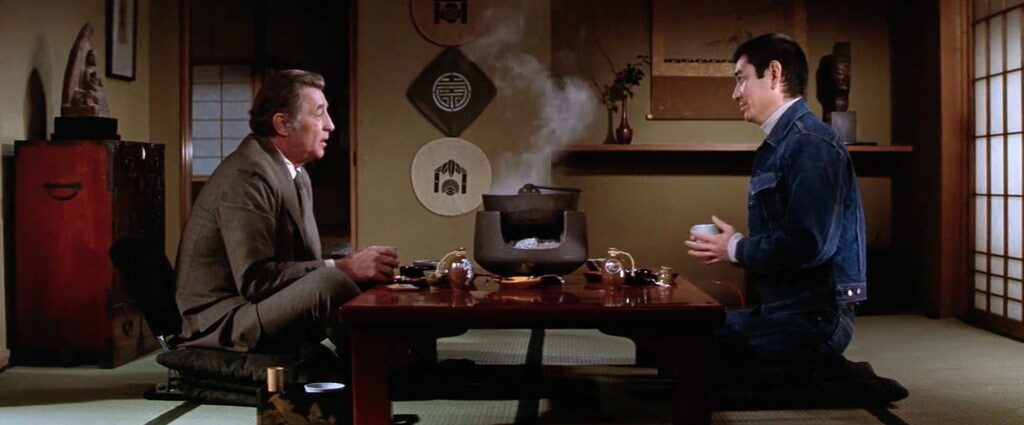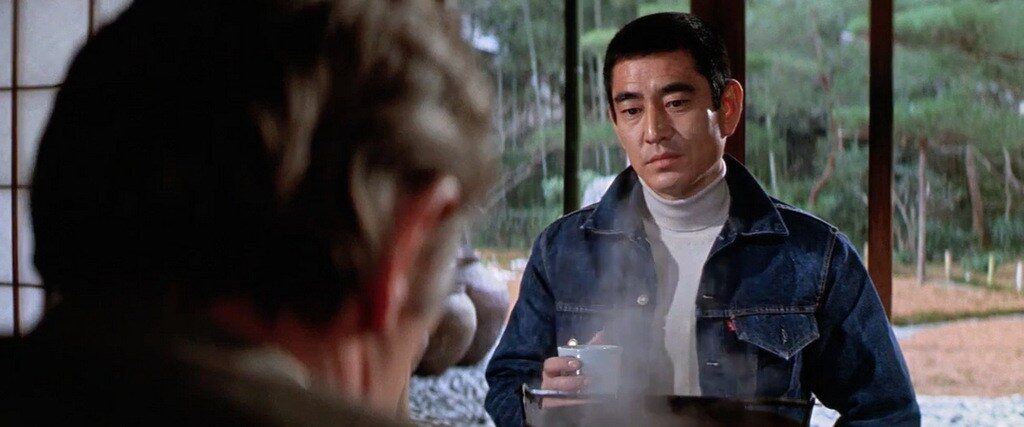Ken Takakura Wearing Levi in The Yakuza (1974) | http://clothesonfilm.net

The Levi jacket worn by Ken Takakura as Ken Tanaka in Japan set thriller The Yakuza (1974, costume design by Dorothy Jeakins) is not Japanese denim. It was not made in Japan but is nonetheless representative of a time when denim as symbol of burgeoning Americana in the East would take off into the stratosphere, and has remained so ever since.
Although Levi products were imported into Japan before the 1970s (Levi International was created in 1965), it was not until mid-decade that a Tokyo office was established. This was in response to growing popularity of all things American in Japan, especially denim and especially Levi. There was no single factor as to why, though most likely American G.I.’s being stationed in Japan after World War II played a part. Their civilian clothing was predominantly denim and khaki based. This caught the eye of Japan’s, until then, heavily regimented youth. Moreover when the G.I.’s left Japan much of their surplus civvie and Army stock was left behind and sold through trading posts. Being American was cool and young and Japan wanted in. The 70’s was boom time for denim. What we see Ken Takakura wearing in The Yakuza is crossover fashion in a crossover movie. A blending of East and West that functions as a metaphor for the film itself.


The Yakuza was directed by the late, great Sydney Pollock and written by brothers Leonard and Paul Schrader, the latter of which would go onto write Taxi Driver (1976) and write/direct American Gigolo (1980). That The Yakuza was originally intended as a novel is no great surprise; the narrative is full of, admittedly fascinating, exposition and musing on the cultural divide of Japan and America. In context this is mostly centered on the theme of obligation, or burden, or ‘giri’ in Japanese. Yet despite an obvious divide, The Yakuza does more to bring about an alliance between the two cultures and how, thanks to changing attitudes toward the discipline and uniformity of youth in Japan, they were becoming increasingly intertwined.
While the ins and outs of The Yakuza become almost unfathomably dense, the central plot is a straightforward enough. Former G.I. Harry Kilmer (Robert Mitchum) returns from Los Angeles to Tokyo to rescue the daughter of an old friend who was kidnapped by a yakuza crime clan. He enlists the aid of Ken Tanaka (Takakura), who owes Kilmer for saving the life of his sister during the U.S. occupation and must fulfil his obligation. From here on in twists and turns camber like a helter-skelter, but what remains vital, and at the forefront of everything The Yakuza is trying to say, is that both cultures are collapsing into each other. The lines are blurring. Nowhere is this more apparent than with the clothes that Ken wears. Westernised, contemporary and exemplified by a single garment: the Levi denim ‘Trucker’ jacket.


Dark blue denim (not raw) 557 Trucker jacket by Levi worn with upturned, ‘popped’ collar, two welt hand pockets to the chest, Levi Red Tab label on the left hand pocket; jeans, straight leg, likely Levi, in matching colour and weight; lightweight cashmere long-sleeve, roll-neck sweater in pale grey.
This outfit does not have much in the way of screen-time, just one scene to be precise, but is meaningful in terms of how much a man like Ken, who we recognize as ‘old Japanese’ has embraced, or rather accepted, Americana as part of his culture. Ken wears similar clothing throughout the film – an East / West smart-casual combo. Of particular note is a black leather jacket seen when he and Kilmer storm a yakuza stronghold about mid-way through the story. Again worn with popped collar, it in fact fits very similar to the Trucker, as in close to the body and almost cropped by modern standards, although this is less noticeable because jeans and trousers were routinely cut much higher back then. This leather jacket could have even been made by Levi as they were producing items in a similar style at the time and shipping them internationally. Most significant though is what all Ken’s casual ensembles represent: a rejection of his yakuza past, but, and this is most significant of all, not its ideology.


Early in The Yakuza, Ken wears the costume associated with his martial art, Aikido, and in a general sense the yakuza themselves. It is primarily comprised of a ‘Hakama’, which is essentially wide-leg trousers with five pleats to the front and back. He forgoes ‘Bogu’, the protective face mask and armour. Yet tucked inside a blue Harrington, Ken does wear the same bandage-like wrapping as the rest of the yakuza for the sword fight climax of the film. This, according to Sydney Pollock, is there to “keep your internal organs in if you get sliced open”. Function and form, then.
While it was still unusual to see so much American denim, and specifically American Levi, in a film shot and set in Japan in the early 1970s, nowadays this same market is awash, and some might argue entirely kept alive by American influenced denim. As with whiskey, the Japanese have now refined their own creation of a product once seen the preserve of an entirely different nation to the point where it is, depending on your opinion, as good as, better than, or world leader. Big John, the first Japanese selvedge denim producer, took off in the late 1970s / early 80’s and no doubt inspired Levi to drop their ‘Big E’ label as once denotive of high end denim (Big E was in official use until 1971) and instead introduce LVC (Levi Vintage Clothing).


Presently Japan is the world’s most ardent consumer of LVC re-issued shirts, jeans, jackets, waistcoats and accessories from the Levi archives. The genesis of this we saw beginning with The Yakuza movie. Just a few minutes on screen; a beautifully cut, beautifully fitting Levi Trucker jacket on a former member of the yakuza drinking tea and talking giri. Contemporary costume is an essential part of how we consume history because it interprets current worldwide culture and preserves it as a reference we can access many years later. The Yakuza is vastly underappreciated in this regard and deserves to be revisited by a far wider audience.
The Yakuza is currently available on DVD and special edition Blu-Ray.
Screencaps taken from the 2003 DVD release.
© 2018, Lord Christopher Laverty.